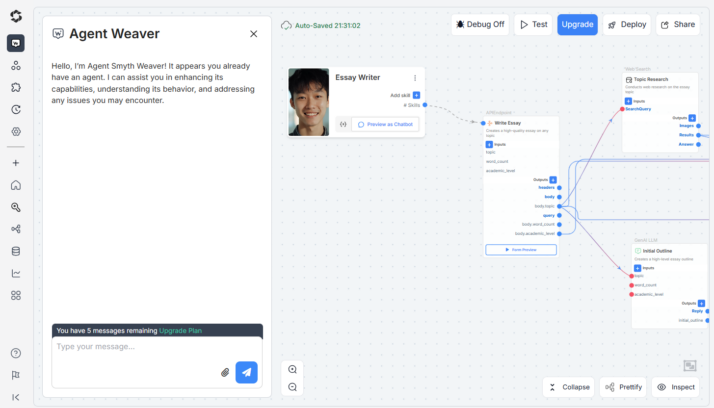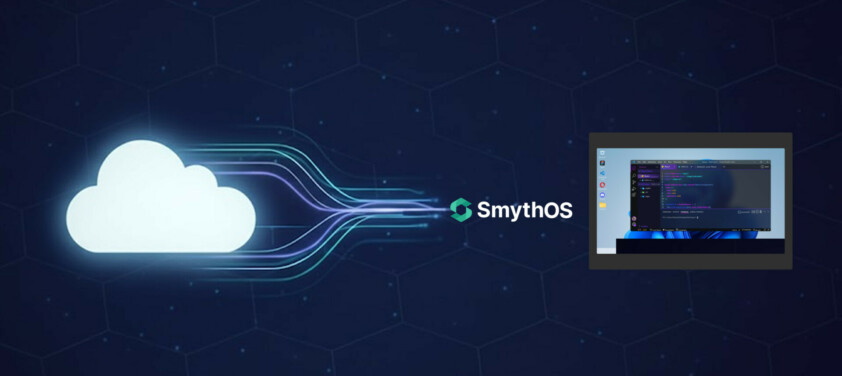At SmythOS, we’ve been working on something our community has been asking for: a way to run agents on your own infrastructure without depending on cloud services.
We’ve released the alpha version of the SmythOS OSS Docker Distribution–SmythOS-Studio. SmythOS-Studio is a self-hosted runtime, packaged for Docker, that enables you to build and deploy AI agents wherever you need them.
What We’re Shipping
The SmythOS-Studio packages our core agent runtime for Docker. With this, you get two images that work together in a single Docker Compose stack:
- Backend Image (Runtime): Provides core agent execution, configuration endpoints, vault access, and basic debug/inspect surfaces. Ships with opinionated defaults for local deployments; production knobs are exposed via environment variables.
- Frontend Image (Studio UI): Delivers the builder canvas, agent pages/settings, authentication flows, and admin views needed to create and operate agents. Intended to run alongside the backend in a single Compose stack.
- SRE Local Storage Adapter: Local, file-system-backed storage for binaries and temporary artifacts during evaluation. Designed to be swappable for S3/MinIO when you’re ready to scale. Image names and tags follow the release notes for each drop (backend, frontend, sandbox). Use the published tags for reproducible installs.
Benefits
Setting up SmythOS-Studio couldn’t be easier. With a single Docker Compose file, you can spin up the entire stack, backend, frontend, and even an optional worker, without worrying about manual system installs.
Everything runs inside consistent, portable containers, so whether you’re on a laptop, a VM, or Kubernetes, it just works. No more “but it worked on my machine” headaches. Because images and environment templates are pinned, every upgrade or rollback is predictable and repeatable. And if you’re using GitHub Actions or another CI/CD platform, you can plug your containers right in for automated testing and version control.
What’s Included (Alpha)
Let’s be clear about what’s here and what’s on the way.
With this release, you get everything you need to start building: the full Builder and Agent Runtime with a visual builder, agent page, and agent settings. Security comes standard with Vault, authentication, global variables, and embodiment configuration. You’ll also find built-in tools for debugging and inspection, local artifact storage via the SRE adapter, and chat support with a bit of manual setup.

Requires Setup / Additional Configuration:
A few things require quick setup, such as pointing your environment variables and DNS to the host where your stack runs, or configuring the route for images and binaries, which currently defaults to local SRE storage. Some advanced features, including Weaver, Data Pool, Subdomains, Analytics, Templates, Integrations, and team management, are still in progress and will roll out after this alpha phase.
Known Constraints:
There are a few known limits, such as analytics and logs are still being refactored, storage is local-first (S3 support is currently scheduled to land in November), and production domains aren’t yet supported. Coming soon are sandboxed execution for safer skill isolation and Kubernetes-based scaling for automated orchestration.
Why This Matters
Not every organization can rely on the cloud, and many shouldn’t have to. Government systems with strict security rules, enterprises on isolated networks, and research teams bound by on-prem requirements all need options that respect their boundaries.
The SmythOS Studio OSS Docker Distribution was built for exactly that. It delivers a consistent, secure runtime across local machines, VMs, and internal infrastructure. Teams get reliability, smooth CI/CD integration, and full control, all without depending on external cloud services.
What sets SmythOS-Studio Apart
SmythOS-Studio is a true production runtime for intelligent agents, something other platforms only touch on. n8n excels at workflow automation but isn’t designed for agentic use cases, with key features like SSO, RBAC, and logging reserved for enterprise tiers.

Dify offers an easy visual interface, but it struggles with multi-agent coordination and scalability at higher loads. SmythOS brings it all together: hybrid deployment options, version control, CI/CD, and testing, giving teams the security, flexibility, and performance needed to run agents confidently in production.
Why This Matters
Most agent projects don’t make it to production. You’ve probably seen the statistics. The reasons vary: fragile orchestration, security gaps, lack of durability, and concerns about vendor lock-in. But the pattern stays consistent.
Frameworks like LangChain and LangGraph work well for prototypes. Workflow tools like Zapier and n8n make automation accessible. None of them are true runtimes. None provides the kernel-level guarantees enterprises demand.
SmythOS does. SymthOS-Studio inherits the same orchestration to remove fragility, security to enforce governance, memory to guarantee durability, and interoperability to avoid lock-in. It’s the backbone that turns proof-of-concept demos into production systems.
That’s what we’re building toward. Not just another tool for spinning up agents, but infrastructure that makes agents reliable enough to trust.
Getting Started
SmythOS Studio is now available. Here’s how to get started:
Check out the SmythOS-Studio repo on GitHub.
Read the setup documentation for detailed installation and configuration instructions.
Remember, you’ll need Docker and Docker Compose installed. Our setup guide walks through environment configuration and DNS basics for local domains.
This is early-stage (alpha) software, and while some features are still on the way, the foundation is strong and evolving fast. We’re building it hand-in-hand with teams who need complete control over their agent infrastructure, and every release brings us closer to a stable, production-ready experience.
So, fork the repo, explore the stack, and share your findings: file issues, submit fixes, or start a conversation in Discord.
Star the SmythOS repo to follow new builds and contribute to the growing ecosystem.
Join the Discord community to connect with other developers, discuss ideas, and collaborate on improvements.
From research labs to offline environments to hobby projects, SmythOS-Studio is designed to run where you do.
Be part of the journey and help define the next generation of agentic infrastructure.
